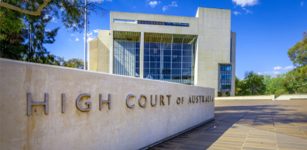High Court Rules that Abortion Safe-Zones are Constitutional

Two anti-abortion activists have lost their appeals against Victorian and Tasmanian laws which prohibit protesting near abortion clinics.
Kathleen Clubb and Graham Preston appealed against laws which establish safe-zones near abortion clinics.
The conduct of the appellants was holding placards with phrases like “everyone has a right to life” in the case of Mr Preston, while Ms Clubb was handing out anti-abortion pamphlets to people trying to access the clinic.
They appealed on the basis that the constitution implies a freedom of political communication, and the laws which establish safe-zones breach this freedom.
The case went all the way up to the highest court in the land, which ultimately dismissed the appeals on the basis that the laws serve a legitimate purpose and are therefore valid.
Implied freedom of political communication
Freedom of speech is not guaranteed by the Australian Constitution.
However, the High Court has found that a freedom of political communication is implied by the constitution as a result of the fact that section 7 requires the Senate to be composed of senators “directly chosen by the people of the State”, and section 8 requires the House of Representatives to be “composed of members directly chosen by the people.”
In the case of Australian Capital Television v Commonwealth (1992) , the High Court found that freedom of political communication is the only way that a citizen can:
“communicate his or her views… criticize government decisions and actions, seek to bring about change, call for action where none has been taken and in this way influence the elected representatives… Absent such a freedom of communication, representative government would fail to achieve its purpose, namely, government by the people through their elected representatives.”
The freedom is not restricted merely between the public and government – it extends to political communications between individuals and groups within the community.
The court made clear the freedom is essential because citizens cannot make informed decisions unless they have access to information, and public discussion is seen as an essential element of our political process.
Limitations on freedom of political communication
However, this freedom of political communication is not unlimited.
The test for whether a law can legitimately encroach upon the freedom is contained the case of Lange v Australian Broadcasting Corporation (1997), which is also known as the “Political Free Speech Case.”
The High Court justices in that case found that the curtailment of the freedom is allowed if the enacted law satisfies a legitimate purpose and fulfills two conditions:
- It is compatible with the maintenance of the representative and responsible government mandated by the Constitution, and
- It is “reasonably appropriate and adapted” to the fulfilment of a legitimate purpose.
They remarked, “the freedom of communication which the Constitution protects is not absolute. It is limited to what is necessary for the effective operation of that system of representative and responsible government provided for by the Constitution.”
The recent decision
In relation to Ms Clubb’s appeal, a number of the High Court justices noted her admission that she was not handing out political material but simply taking part in an academic exercise against the safe-zeone laws.
As a result, Justice Stephen Gageler echoed the sentiments of the other justices in finding there was no political communication and her appeal was therefore “doomed” to fail.
The appeal was dismissed without determining the validity of the broadest section of Victoria’s laws, which make it illegal to engage in communications related to abortions in the vicinity of clinics that are “reasonably likely to cause distress or anxiety”.
Chief Justice Keiffel, Justice Virginia Bell and Justice Patrick Keane agreed more broadly that “The burden on political communication imposed by the prohibition is slight.” Their remarks were to the effect that while the prohibition affects political communication, the impact is minimal as it only applies to a 150 metre zone near the clinics.
The justices noted there is no general right to protest, let alone “in the presence of a captive audience of pregnant women seeking terminations and those involved in advising and assisting them.”
They found the prohibition to be “suitable” and bore a “rational connection to its purpose.”
Justice Nettle ultimately found that:
“Given that the proscription leaves protesters free to conduct protests in relation to terminations outside the access zone, and that there is no evidence or other reason to accept that political protest against terminations outside the access zone is any less effective as a tool of political persuasion than protest within”, any impediment the safe access zones had on political freedom was “negligible”.”
The legitimate purpose of the bans therefore prevailed over the slight encroachment on free political communication.
Laws in New South Wales
In our state, the Public Health Amendment (Safe Access to Reproductive Health Clinical) Bill 2018, similarly imposed a 150-metre ‘safe access zones’ around abortion clinics.
This law passed easily through the Legislative Assembly by 61 votes to 18.
The law prohibits interfering with any person who seeks to access or leave a clinic, filming without consent and communicating about abortions in a manner that is reasonably likely to cause anxiety or distress.
People who breach the law are liable to up to six months in prison and/or a fine of $5,000. A second or subsequent offence attracts a maximum penalty of 12 months in prison and/or a fine of $10,000.
The High Court’s decision means these laws are almost certain to be considered constitutional.
The Human Rights Law Centre welcomed the High Court’s decision, stating:
“With today’s decision, women in Victoria and Tasmania never again need to worry about being forced to run a gauntlet of abuse to access abortion care”.
“Safe access zones are here to stay.”







